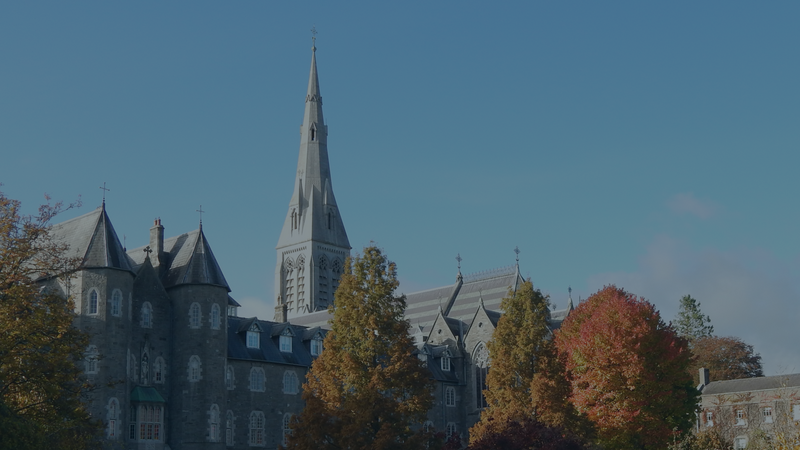Module Level
MTh/STL/PHD
Related Department
Theology
Time Allowance
Time Allowance for Constituent Elements: Lectures: 24 hours Assignment: 15 hours Private study: 40 hours
Assessment
Presentation & Paper: After the introductory classes, students will take it in turns to make a presentation on a particular liturgical work of the early Church. Each student is expected to read the week’s text and be familiar with it. Then the student who is presenting will introduce the text to the class and make a 10-15 minute presentation on the work they have chosen, giving a brief historical background and summary of the text and (indicate how the text is relevant to the theology of liturgy today. This will be followed by a class discussion on the text in question. Students will be expected to select their text during the second week of class. The final paper for the course will be based on the text they have presented in class. It will summarize their presentation, but must also be reworked in the light of the class discussion on the text in question. Readings: Bradshaw’s The Search for the Origins of Christian Worship is the module textbook and students are expected to obtain personal copies of this book. Other readings, mainly of primary sources, will be provided in an easily accessible format on a week-by-week basis. Students are expected to consult Moodle at least on a weekly basis (n.b. the instructor can see when you last logged on to Moodle). The instructor will endeavour to post the readings for the following class by the day of the previous class.
Module Aims
This module will introduce students to the early liturgy of the Christian Church. Beginning with the scriptural foundations and Jewish roots of Christian liturgy, the course will explore its historical development during the period of the Early Church and theological grounding and relevance for Christians today.
A deeper appreciation of the liturgy of the early Church (with an emphasis on Baptism and Eucharist) will enable students to have a better general understanding of the Church and Christianity in general in accord with the famous maxim, lex orandi, lex credendi or, more accurately, ut legem credendi lex statuat supplicandi (“that the law of prayer establishes the law of belief”).
Students will attain the necessary methodological and research skills for further study in academic and pastoral liturgy and research in the field of comparative liturgy. In turn, this will provide students with the tools to study church history, patrology and other theological disciplines.
- Indicative Syllabus
- Getting started: Expectations, Outlines and Assessments
- General outline of the course – the importance of studying the liturgy of the early Church
- Liturgy in the Old and New Testament.
- The Jewish Background of Christian Liturgy,
- Ancient Church Orders,
- Other Major Liturgical Sources.
- The Evolution of the Rites of Christian Initiation.
- The Evolution of the Eucharistic Rites.
- The Sanctification of Time in the Early Church.
- Ministry and Marriage
- The Contemporary Relevance of the Liturgy of the Early Church.
Indicative Bibliography
- Baldovin, John. “The Uses of Liturgical History.” Worship 82 (2008): 2-18.
- Bouley, Allan. From Freedom to Formula: The Evolution of the Eucharistic Prayer from Oral Improvisation to Written Texts. Washington, DC: The Catholic University of America Press, 1981.
- Chupungco, Anscar J. Handbook for Liturgical Studies 4. Vol. Collegeville, MN: Liturgical Press, 1999-2000. Volume I: Introduction to the Liturgy (1997); Volume II: Fundamental Liturgy (1998); Volume III: The Eucharist(1999); Volume IV: Sacraments and Sacramentals (2000).
- Deiss, L. Springtime of the Liturgy, Liturgical Press, Collegeville, MN 1979.
- Jasper, R. C. D. and G. J. Cuming. Prayers of the Eucharist: Early and Reformed. 4th Ed. with Maxwell Johnson (Collegeville, MN: Liturgical Press, 2019).
- Johnson, Lawrence J., trans. and ed. Liturgy: Worship in the Early Church: An Anthology of Historical Sources. Collegeville, MN: Liturgical Press, 4 Volumes 2009.
- Jungmann, Josef Andreas, The Early Liturgy to the Time of Gregory the Great. Trans. Francis A. Brunner. Notre Dame, IN: University of Notre Dame Press, 1959.
- Jungmann, Josef Andreas, Christian Prayer through the Centuries. Trans. John Coyne. Ed. Christopher Irvine. New York: Paulist Press, 2007.
- Klauser, Theodor. A Short History of the Western Liturgy: An Account and some Reflections.2nd Ed. Oxford: OUP, 1979.
- Martimort, Aimé Georges. The Church at Prayer: An Introduction to the Liturgy, trans. Matthew J. O’Connell, 4 vol. Collegeville, MN: Liturgical Press, 1988. Volume I: Introduction to the Liturgy; Volume II: The Eucharist; Volume III: The Sacraments and Volume IV: The Liturgy and Time.
- Metzger, Marcel. History of the Liturgy: The Major Stages (Collegeville, MN: Liturgical Press, 1997).
- O’Donoghue, Neil Xavier. “The Shape of the History of the Eucharist.” New Blackfriars, 93 (2012): 71-83.
- The Oxford History of Christian Worship. Eds. Geoffrey Wainwright and Karen B. Westerfield Tucker. New York: Oxford University Press, 2006.
- Palazzo, Eric. History of Liturgical Books from the Beginning to the Thirteenth Century. Trans. Madeleine Beaumont. Collegeville, MN: The Liturgical Press, 1998.
- Pecklers, K. Liturgy: The Illustrated History. Mahwah, NJ: Paulist Press, 2012.
- Vogel, Cyrille. Medieval Liturgy: An Introduction to the Sources. Trans. and Revised William G. Storey and Niels Krogh Rasmussen. Washington, DC: The Pastoral Press, 1986.
N.B. Many readings are from primary sources in English translation. The lecturer will provide these on Moodle.
Bibliography
- — Textbook Bradshaw, Paul F. The Search for the Origins of Christian Worship: Sources and Methods for the Study of Early Liturgy. Second Edition. New York: Oxford University Press, 2002.
- —

